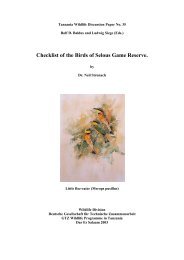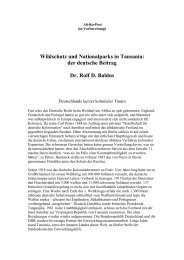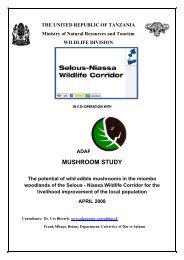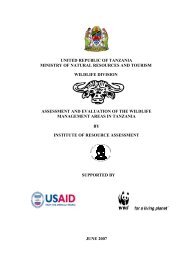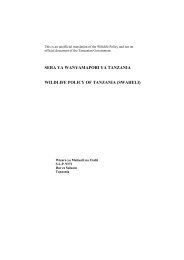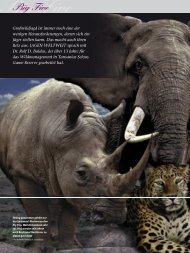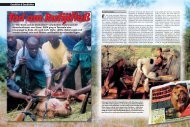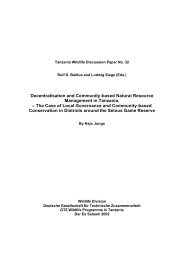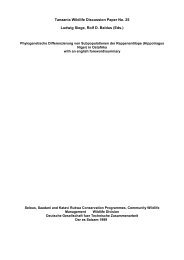African Indaba Articles - wildlife-baldus.com
African Indaba Articles - wildlife-baldus.com
African Indaba Articles - wildlife-baldus.com
You also want an ePaper? Increase the reach of your titles
YUMPU automatically turns print PDFs into web optimized ePapers that Google loves.
Sands. Have a look at the ballooning “wilderness” share block developments in some private nature reservesadjacent to KNP with, more often than not, hundreds of occupants.Who do you think is more “consumptive” and whose carbon footprint on the environment is greater?The hunters, who hunt and kill a very low percentage of mature male specimens of the varied gamepopulations; who use relatively rustic and unobtrusive camps, a couple of vehicles, and pay dearly for theprivilege of some weeks of wilderness solitude) – or the eco-tourists, residing in luxury air-conditionedlodges, the swimming pool in front of the door, a generator creating 24 hours of electricity, twice a day freshtowels and linen and exotic food and fine champagne on the table.?Think of all the water pumped and used, of the refuse dumps behind the scenes, of the diesel burned, ofthe hundreds of acres of wilderness converted into manicured “romantic bush camps”. On game drives,vehicles hooked on radio networks are speeding to “Big Five” sightings, in many cases lining up to wait theirturn, following and disturbing hunting predators to get that grand photograph. Our eco-tourist in<strong>com</strong>e <strong>com</strong>esat a high environmental price. Non-consumptive? I’ve heard better jokes!Eco-tourism is consumptive – the consumption pattern is just different.With this article I am addressing all hunters and conservationists of good intentions. We need a civilizeddebate. It makes no conservation sense to continue the polemic consumptive/non-consumptive usecontroversy. This controversy is rooted on false premises – a fact eagerly exploited by those on both sides,who profit from bitter trench warfare.Hunting and non-hunting conservationists have reached en<strong>com</strong>passing understandings elsewhere in theworld – just look to North America, where many major conservation NGOs are working closely together withhunters and anglers.The Nature Conservancy (http://www.nature.org/), an organization with more than one million membershas a mission statement which says: “The mission of The Nature Conservancy is to preserve the plants,animals and natural <strong>com</strong>munities that represent the diversity of life on Earth by protecting the lands andwaters they need to survive” Hardly the statement of a pro-hunting conservation NGO, you would think. Butwait and read the Autumn-2006 issue of Nature Conservancy Magazine. There is a feature article explaining“why American sportswomen and sportsmen are among the Nature Conservancy’s valued allies”. You candownload Hal Herring’s <strong>com</strong>prehensive article athttp://www.nature.org/magazine/autumn2006/features/art18601.html . It offers a refreshingly different viewfrom what we are used to hear from the anti-hunting lobby and their standard bearers in South Africa. Searchresults on “hunting” at the Nature Conservancy’s website show 772 items – enough reading material for awhile!Other big “green” groups such as the National Audubon Society and the Sierra Club have neveropposed hunting. In fact, they recognize the sport as a legitimate and necessary <strong>wildlife</strong>-management tool.Ted Williams writes in his article “Natural Allies” on the Sierra Club’s website, that “they are perceived asanti-hunting because of embarrassing behavior by some of their members”. And Sierra Club legislativedirector Debbie Sease says “As the Sierra Club works to defend these places, we will continue to reachout to the hunters and anglers who have a stake in them. We’re natural allies.” You can read this atwww.sierraclub.org/huntingfishing/index.asp.Even in South Africa conservation organizations are outing themselves as pro-hunting, although some stillrefrain from making the fact too obvious.At the 3rd World Conservation Congress (2004) a re<strong>com</strong>mendation introduced by the Game RangersAssociation Africa (GRAA), the Endangered Wildlife Trust (EWT) and South <strong>African</strong> National Parks“accepting that well-managed recreational hunting has a role in the managed sustainable consumptive use of<strong>wildlife</strong> populations” and “condemning killing animals in small enclosures where they have little or no chanceto escape” was adopted by the plenum. WWF on a global level and WWF-SA have developed cautiouslypositive hunting policies.The press release at the IUCN-sponsored <strong>African</strong> lion workshops in Johannesburg (2006) says that“regulated trophy hunting is not considered a threat, but [a] way to help alleviate human-lion conflict andgenerate economic benefits for poor people to build their support for lion conservation. Foreign hunters bringmillions of dollars each year into <strong>African</strong> economies.”98



